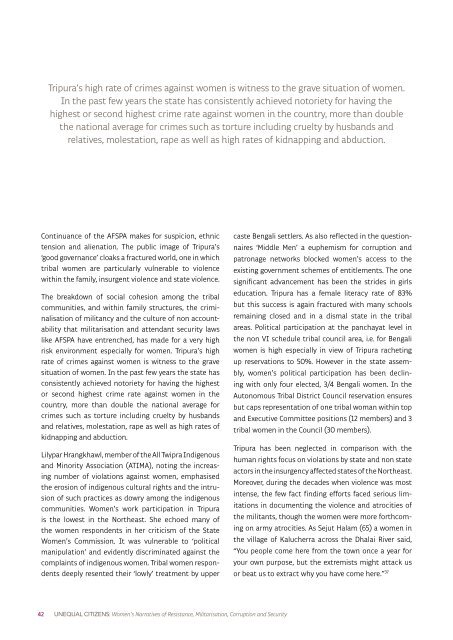CC_India
CC_India
CC_India
You also want an ePaper? Increase the reach of your titles
YUMPU automatically turns print PDFs into web optimized ePapers that Google loves.
Tripura’s high rate of crimes against women is witness to the grave situation of women.<br />
In the past few years the state has consistently achieved notoriety for having the<br />
highest or second highest crime rate against women in the country, more than double<br />
the national average for crimes such as torture including cruelty by husbands and<br />
relatives, molestation, rape as well as high rates of kidnapping and abduction.<br />
Continuance of the AFSPA makes for suspicion, ethnic<br />
tension and alienation. The public image of Tripura’s<br />
‘good governance’ cloaks a fractured world, one in which<br />
tribal women are particularly vulnerable to violence<br />
within the family, insurgent violence and state violence.<br />
The breakdown of social cohesion among the tribal<br />
communities, and within family structures, the criminalisation<br />
of militancy and the culture of non accountability<br />
that militarisation and attendant security laws<br />
like AFSPA have entrenched, has made for a very high<br />
risk environment especially for women. Tripura’s high<br />
rate of crimes against women is witness to the grave<br />
situation of women. In the past few years the state has<br />
consistently achieved notoriety for having the highest<br />
or second highest crime rate against women in the<br />
country, more than double the national average for<br />
crimes such as torture including cruelty by husbands<br />
and relatives, molestation, rape as well as high rates of<br />
kidnapping and abduction.<br />
Lilypar Hrangkhawl, member of the All Twipra Indigenous<br />
and Minority Association (ATIMA), noting the increasing<br />
number of violations against women, emphasised<br />
the erosion of indigenous cultural rights and the intrusion<br />
of such practices as dowry among the indigenous<br />
communities. Women’s work participation in Tripura<br />
is the lowest in the Northeast. She echoed many of<br />
the women respondents in her criticism of the State<br />
Women’s Commission. It was vulnerable to ‘political<br />
manipulation’ and evidently discriminated against the<br />
complaints of indigenous women. Tribal women respondents<br />
deeply resented their ‘lowly’ treatment by upper<br />
caste Bengali settlers. As also reflected in the questionnaires<br />
‘Middle Men’ a euphemism for corruption and<br />
patronage networks blocked women’s access to the<br />
existing government schemes of entitlements. The one<br />
significant advancement has been the strides in girls<br />
education. Tripura has a female literacy rate of 83%<br />
but this success is again fractured with many schools<br />
remaining closed and in a dismal state in the tribal<br />
areas. Political participation at the panchayat level in<br />
the non VI schedule tribal council area, i.e. for Bengali<br />
women is high especially in view of Tripura racheting<br />
up reservations to 50%. However in the state assembly,<br />
women’s political participation has been declining<br />
with only four elected, 3/4 Bengali women. In the<br />
Autonomous Tribal District Council reservation ensures<br />
but caps representation of one tribal woman within top<br />
and Executive Committee positions (12 members) and 3<br />
tribal women in the Council (30 members).<br />
Tripura has been neglected in comparison with the<br />
human rights focus on violations by state and non state<br />
actors in the insurgency affected states of the Northeast.<br />
Moreover, during the decades when violence was most<br />
intense, the few fact finding efforts faced serious limitations<br />
in documenting the violence and atrocities of<br />
the militants, though the women were more forthcoming<br />
on army atrocities. As Sejut Halam (65) a women in<br />
the village of Kalucherra across the Dhalai River said,<br />
“You people come here from the town once a year for<br />
your own purpose, but the extremists might attack us<br />
or beat us to extract why you have come here.” 37<br />
42 UNEQUAL CITIZENS: Women’s Narratives of Resistance, Militarisation, Corruption and Security


